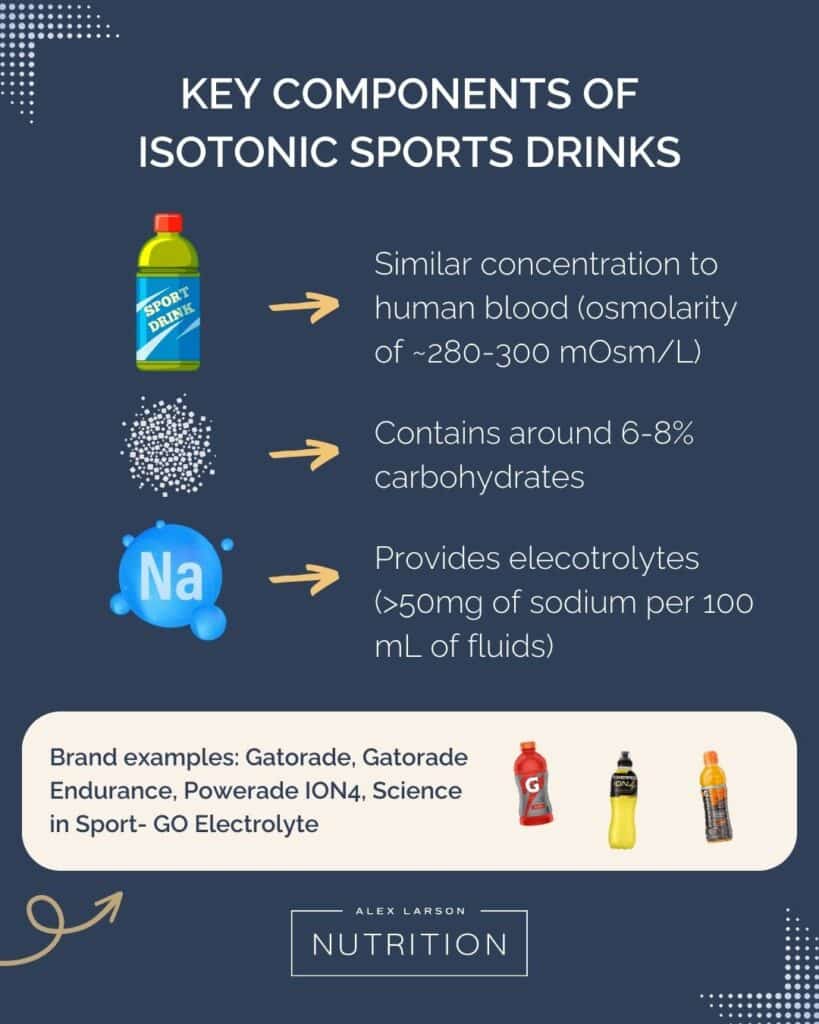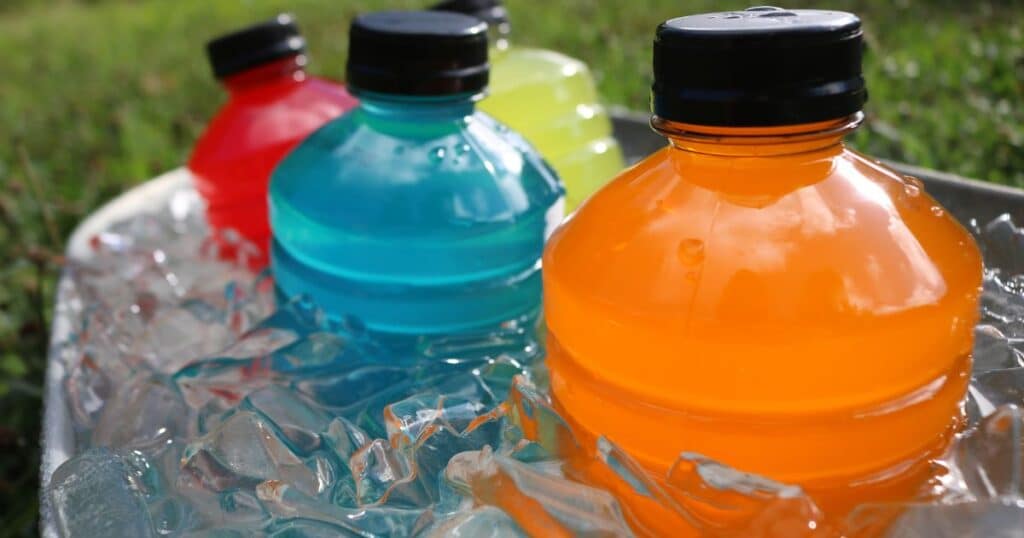Level Up Your Nutrition Game With Our Freebies
Alex
I provide nutrition coaching for endurance athletes to improve performance and body composition through a simple and flexible eating style.
Hi, I'm
ATHLETE EATING GUIDE →
LEARN MORE →
ATHLETE GROCERY SHOPPING GUIDE →
10-DAY PROTEIN-PACKED SAMPLE MEAL PLAN
READY TO FUEL?
incredible value!
The fueling guide bundle serves as your one-stop-shop for strategies to fueling before, during and after your workouts.
There are countless sports drink options available to endurance athletes, each promising performance-enhancing benefits. Sports drinks can be an important part of your training and race day nutrition plan for endurance athletes. Though, it is absolutely important to ensure that you are opting for the right sports drink for you. Let’s review an increasingly hot (and slightly confusing) topic, isotonic sports drinks, so you can ensure you are choosing the right fit!
Understanding Isotonic Sports Drinks

The term isotonic implies a solution that is similar “thickness” or concentration (tonicity) as another solution. Isotonic sports drinks contain similar concentrations of water, sodium and carbohydrate concentrations as in the human body. These sports drinks are formulated to quickly replace fluids lost during exercise but with a boost of carbohydrates. This increase in carbohydrates fuels the demands of your day-to-day endurance training and also racing.
Key Components of Isotonic Sports Drinks
While there are a wide variety of sports drinks available on the market, an isotonic sports drink typically meets the following criteria:
- A liquid that has a similar concentration to human blood (with an osmolarity of ~280-300 mOsm/L)
- Contains around 6-8% carbohydrates and delivers 1.5-2 times the amount of carbohydrates than most hypotonic drinks do (30g per 500mL serving)
- Typically provides additional electrolytes. In general, it’s >50mg of sodium per 100 mL of fluids. Electrolytes are important to improve muscle performance, optimize recovery, increase cardiovascular output, decrease the risk of muscle cramping, and improve endurance
- Specific brand examples include: Gatorade, Gatorade Endurance, Powerade ION4, Science in Sport- GO Electrolyte, among many others

Comparing Tonicity of Sports Drinks
Tonicity sounds like a very technical term but don’t let it overwhelm you! In the world of sports drinks, you may also hear the terms:
Hypotonic
Hypotonic has a lower concentration of fluids, sugars, and sodium than blood. These drinks give the lowest concentration of carbohydrates (<5%) and sodium than blood. Hypotonic sports drinks are a good go-to option when your primary goal is hydration.
With hypotonic sports drinks, typically you don’t need a large amount of energy or carbohydrates because the concentration level allows fluids and electrolytes to flow quickly from the gut to the bloodstream. Brands marketed as hypotonic include SOS Hydration Drink Mix, Powerade Zero, Nuun Electrolytes, among many others.
If you’re showing signs of dehydration and/or hyponatremia (low sodium levels) you want to grab a hypotonic solution to help get yourself rehydrated as quickly as possible. Or, you know, an IV works too. It’s important to note that hypotonic sports drinks focus primarily on rehydration and therefore do not provide maximum carbohydrates per serving. Though there is a much lower risk of bloating, cramps and gastrointestinal issues that come with consuming a hypotonic sports drink.
When to use: Ideally use hypotonic sports drinks for rapid rehydration. Also, they are great for boosting electrolytes pre-workout, during shorter sessions, in increasingly hot weather, or when you need to rehydrate quickly.
Hypertonic
Hypertonic has a higher concentration of fluids, sugars and sodium than blood. These give the highest concentration of carbohydrates (typically >8%) compared with hypotonic and isotonic sports drinks. Hypertonic sports drinks may have a dehydrating effect because the body has to pull fluids away from the bloodstream and into the gut to help dilute that higher concentration of carbohydrates. For some athletes, this can increase symptoms such as nausea and also thirst.
Hypertonic sports drinks are a fantastic go-to when your priority is gaining significant carbohydrates and calories. Recovery drinks that offer carbohydrates and some protein are considered hypertonic and work well for post-workout.
When to use: As a recovery drink after intense or sustained exercise, or for extra carbohydrates in your carb-loading plan heading into a big workout or race.
The Role of Isotonic Sports Drinks in Endurance Performance

Sports drinks in general, including isotonic sports drinks, are a useful tool for fueling your workouts and races. Research overwhelmingly shows that sports drinks are a palatable and efficient way to hydrate and reintegrate electrolytes, carbohydrates, and other nutrients lost during training and racing. Research also shows that isotonic sports drinks specifically prior to training or competition may reduce muscle damage.
When to Use Isotonic Sports Drinks
While isotonic sports drinks tend to sound super fancy and hope-promising, in the real world, these products have the potential to cause unwanted side effects. Unfortunately, this includes the propensity for gastrointestinal issues. This likelihood is increased when isotonic sports drinks are consumed in large quantities. As in the case of an ultramarathon, Ironman, or long cycling event. This propensity for gastrointestinal issues may be increased in hotter conditions when the sweat rate drives a faster rate of drinking, or when combined with energy gels.
Isotonic sports drinks are typically more useful for shorter-duration, high-intensity exercise where getting carbohydrates in quickly can be more important than warding off dehydration.
Tips for Incorporating Sports Drinks Into Your Routine
If you are new to using sports drinks in your day-to-day routine, be sure to consider the following:
- Read labels and choose high-quality brands. In general, avoid unnecessary ingredients such as artificial sweeteners and added fibers.
- Experiment with a wide variety of flavors to see what works best for you. Flavor fatigue can be very real, especially when you are 40 miles into your ultramarathon and the thought of an “orange dream” isn’t so dreamy anymore. Also, remember that there is no one-size-fits-all regarding running and race-day nutrition. If all of your training buddies use a popular-marketed sports drink or sports nutrition product, it still may not work for you. And this is okay.
- Always be sure to practice on repeat, ideally in varying weather conditions. Severe heat, humidity, and altitude may affect your endurance training and nutrition plan. Know your sweat rate in changing weather conditions so you can adjust your hydration plan if needed.
- Always begin your workout well-hydrated. The body cannot absorb carbohydrates efficiently when it’s dehydrated, especially chronically.
Staying Hydrated is Paramount to Performance

It is imperative to stay adequately hydrated at baseline day in and day out. According to the National Academy of Sports Medicine, the recommended fluid intake for men is 125-130 oz/day (approx. 16 cups) and 91-95 oz/day (approx. 12 cups) for women. Remember that this number can increase depending on your baseline training duration and intensity.
Start tracking your water intake in an app or journal over the course of a few days and training sessions. Also, remember to regularly include a wide variety of hydrating beverages in your routine. Water, fruit-infused water, milk and milk alternatives, protein drinks, smoothies, herbal teas, and sports drinks including isotonic sports drinks are great options.
Also, be sure to reference our hydration guidelines article to calculate sweat rate so you can better estimate fluid and electrolyte needs for your upcoming training sessions and race. Typically we encourage most endurance athletes to calculate their sweat rate in varying weather conditions, including hot and cold weather. This way you can adjust your fueling and hydration plan for whatever mother nature brings. Fortunately, isotonic sports drinks can absolutely be a part of your hydration plan!
Watch the ALN dietitian team take a deep dive discussion into isotonic sports drinks, caffeine usage, and more!
Tune in to Endurance Eats, Ep. 6 – a video series dedicated to discussing optimal fueling for athletes – triathletes, runners, cyclists and more!
Hit that subscribe button to catch future episodes!
IN THIS EPISODE:
(1:23) – How can you tell the difference between bonking and lack of fitness/fatigue?
(15:00) – When is the best time to take caffeine for a race?
(24:20) – Hypo/hyper/isotonic fuel products – What’s the difference? What should I be using?
Isotonic Sports Drinks: Potential Drawbacks and Considerations
Isotonic drinks tend to sound great on paper but in real life, can contribute to unwanted gastrointestinal issues– abdominal cramping, bloating, diarrhea, among others. Furthermore, specific brands of these products can be quite expensive. Though to a lesser extent if you join our one-on-one coaching program. My athletes receive quarterly credit to the Feed website to utilize on all of their favorite sports nutrition products.
When incorporating isotonic sports drinks into your routine, it is also very important to consider the “tonicity” load. While this is a term that I hand-crafted, it is important to recognize that if you are consuming isotonic sports drinks with hypertonic or hypotonic gels, you may not be achieving your intended fueling results. Furthermore, utilizing solid foods such as sandwiches, trail mix, or even energy bars with your sports drink routine may also affect the tonicity load. This is not necessarily a bad thing versus a consideration heading into your training sessions and into race day.
Most Important- You Do You
Each individual has very unique nutrition needs and it is important that you feel just as confident in your fueling plan as you do with your training and racing plan.
Still, confused about what to choose with your sports drinks and fueling? Nailing down your race day fuel and nutrition plan requires consistent practice and patience. Consider working with a sports dietitian so that you can better tailor your race day fuel plan to what works well for you. My team and I are here to help whenever you’re ready!
Alex
I provide nutrition coaching for endurance athletes to improve performance and body composition through a simple and flexible eating style.
Hi, I'm
LEARN MORE →
take the quiz!
Let's discover your Endurance Nutrition IQ
How well do you know your fueling? Answer these questions and let's see where your endurance nutrition knowledge is at!
Take the quiz
level up your nutrition game with these freebies
free downloadS
Protein-Packed 10-Day Sample Meal Plan
Athlete Eating Guide
Athlete Grocery Shopping Guide
1
2
3
Inspiration to fit 120 grams of protein into your day
Planning what goes on your plate
Putting the right foods in your grocery cart
